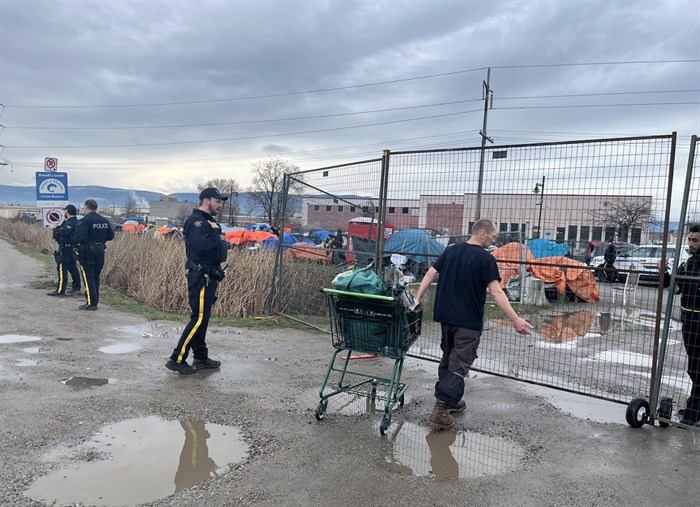Controversial restructure of Kelowna tent city reducing homeless: mayor

A few months after the City of Kelowna's controversial spring cleanup of the Okanagan Rail Trail encampment, the mayor said the site’s restructuring has made progress to reduce homelessness.
Mayor Tom Dyas said at a council meeting Monday, May 27, the encampment had roughly 100 people sleeping there and now, two months later, there are 53 individuals.
“Our goal remains clear to protect public safety while advancing real long-term solutions for those seeking the path out of homelessness," Dyas told council.
The city tore down the encampment without warning and made several arrests on March 26. The city then put in a host of new regulations to change how the outdoor sheltering site operates.
There is a code of conduct, 60 allotted tent sites, restricted access and more regulations. The city said the goal is to make it function more like an indoor shelter rather than a loosely regulated place to camp.
Dyas said the plan is to get people into projects like STEP Place that provide tiny homes as a temporary shelter while people find a permanent living situation. He said 60 people have been transferred to indoor shelters.
READ MORE: Why Kelowna's treatment of homeless encampments has changed over the years
“We want to be clear that our intention is not to fill the remaining spaces at any outdoor sheltering sites. Our goal is to support individuals in moving from outdoor sheltering sites altogether into more stable housing options,” Dyas said.
“It is also important to notice that we have not seen an increase in the number of individuals sheltering on the streets or in other areas of our city compared to previous years as daily counts are done."
Dyas said Kelowna is working with higher levels of government to make systemic changes.
"We will continue to work very closely with not-for-profit organizations, government partners, the RCMP, the federal government to change federal legislation around repeat property offenders, and the provincial government to look at bringing in mandatory care within our community," he said.
To contact a reporter for this story, email Jesse Tomas or call 250-488-3065 or email the editor. You can also submit photos, videos or news tips to the newsroom and be entered to win a monthly prize draw. Find our Journalism Ethics policy here.
We welcome your comments and opinions on our stories but play nice. We won't censor or delete comments unless they contain off-topic statements or links, unnecessary vulgarity, false facts, spam or obviously fake profiles. If you have any concerns about what you see in comments, email the editor in the link above. SUBSCRIBE to our awesome newsletter here.



